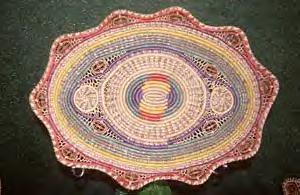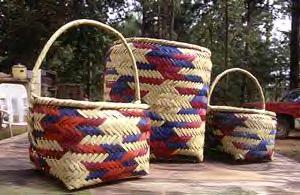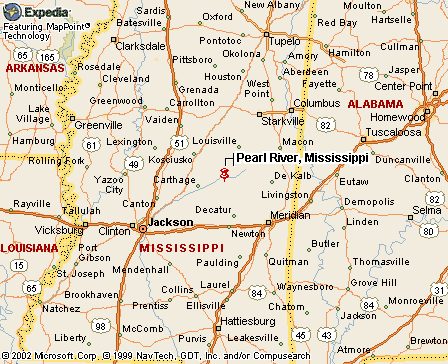|
|
Canku Ota |
|
|
(Many Paths) |
||
|
An Online Newsletter Celebrating Native America |
||
|
November 2, 2002 - Issue 73 |
||
|
|
||
|
Choctaw Tribe Labeled Nationwide Role Model for Industry |
||
|
by Nell Luter Floyd The
Clarion Ledger
|
||
|
credits: Mississippi
Arts Commission © 2000
|
 PEARL
RIVER, MS — Raeneka Alex sells baskets, beaded jewelry and other
Choctaw Indian crafts in the Choctaw Museum Store at Silver Star Hotel
& Casino — just a hop, skip and a jump from where she once played
as a child. PEARL
RIVER, MS — Raeneka Alex sells baskets, beaded jewelry and other
Choctaw Indian crafts in the Choctaw Museum Store at Silver Star Hotel
& Casino — just a hop, skip and a jump from where she once played
as a child.
The ding, ding, ding of the slot machines in Silver Star and Golden Moon casinos — along with the tribe's other businesses — not only provide jobs for Alex and other Choctaws but also generate revenue for tribal government services ranging from education to health care. The Indian Gaming Regulatory Act passed in 1988 requires that revenue from tribal government gaming fund tribal government operations or programs, provide for the general welfare of the tribe, promote tribal economic development, be used for donations to charitable organizations or help fund operations of local government agencies. Here's just one example of what the tribe's business ventures mean: scholarships that make it possible for any Choctaw to attend college for free. The Choctaws paid for Alex to complete a nursing assistant program at Meridian Community College, and she plans to return to college and become a registered nurse. "To complete that program might have been nothing to most people, but my whole family made a big deal out of it," said Alex, the first person in her family to attend college. Nine years ago, there were 100 college graduates in the history of the tribe, said John Hendrix, assistant economic director for the 9,100-member tribe. "This year there are 452 tribal members in college," he said. "The tribe will pay for anywhere they want to go that they're accepted." Once called "the worst poverty pocket in the poorest state in the Union," the Choctaws are now among the country's most successful tribes. In the 35-year span from 1963 to 1998, the average tribal family income rose from $2,000 a year to $24,000, the Washington Times said in a Sept. 16, 1998, report. With manufacturing, service, retail and tourism enterprises that generate about $375 million in sales and an annual payroll of $192.1 million, the Choctaws rank among the top 10 employers in the state. More than 65 percent of the tribe's work force is non-American Indian.
The Choctaws plan to add in the next two years a 285-acre lake, a white sand lagoon, a wellness center, a 10,000-seat arena, a labyrinth, a 250-room hotel and a memorial to Choctaw war veterans. Choctaw Chief Phillip Martin said the expansion should widen the resort's audience. "We try to keep up with national trends and see if we can provide for the interests of traveling people," he said. Ernest Stevens Jr., chairman of the National Indian Gaming Association, said the Choctaws have been a role model in gaming. "If you want to compete in this business, you've got to do a good job — and that's what they've done," he said. The Choctaws had a solid business base when they ventured into gaming, Hendrix said. "That's been instrumental in how the tribe was able to take revenues from gaming and use them wisely," he said. Among the services the Choctaws' gaming and business ventures fund:
Seventy percent of tribal revenue is pumped back into economic development to create jobs and economic stability, Hendrix said. "Chief has always been good about feeding the golden goose," he said. The tribe opened its first company, Chahta Development, in 1969 to build houses for tribal members and give members a skill. Ten years later, Packard Electric, a division of General Motors, committed to opening a facility on the reservation, and Chahta Enterprise opened as the tribe's first manufacturing company producing wiring harnesses for the automotive industry. Industrial expansions brought American Greetings Corp., an automotive speaker plant and a direct mail operation. Now clients of the reservation's businesses include ExxonMobil, Caterpillar, Ford and McDonald's, to name just a few. Since then, the tribe has opened a nursing home, a community retail center and an automotive wiring harness plant in Mexico. Efforts are now focused on replacing low skill, low-paying jobs with higher paying, skilled positions, Hendrix said. Patrick Dan, manager of the Choctaw Museum Shop, said anyone who wants a job now can pretty much get one. "There are plenty of jobs either with the casinos, the tribe or in construction," he said.
|
|
|
||
|
|
||
| Canku Ota is a free Newsletter celebrating Native America, its traditions and accomplishments . We do not provide subscriber or visitor names to anyone. Some articles presented in Canku Ota may contain copyright material. We have received appropriate permissions for republishing any articles. Material appearing here is distributed without profit or monetary gain to those who have expressed an interest. This is in accordance with Title 17 U.S.C. section 107. | ||
|
Canku Ota is a copyright © 2000, 2001, 2002 of Vicki Lockard and Paul Barry. |
||
 |
 |
|
|
The "Canku Ota - A Newsletter Celebrating Native America" web site and its design is the |
||
|
Copyright © 1999, 2000, 2001, 2002 of Paul C. Barry. |
||
|
All Rights Reserved. |
||
 Among
the tribe's largest venture: the $750 million Pearl River Resort, which
includes Silver Star, Golden Moon, Dancing Rabbit Golf Club, several
musical entertainment venues, a spa, more than 20 restaurants, a water
park, a light and water show and a collection of famous film and TV
cars.
Among
the tribe's largest venture: the $750 million Pearl River Resort, which
includes Silver Star, Golden Moon, Dancing Rabbit Golf Club, several
musical entertainment venues, a spa, more than 20 restaurants, a water
park, a light and water show and a collection of famous film and TV
cars.